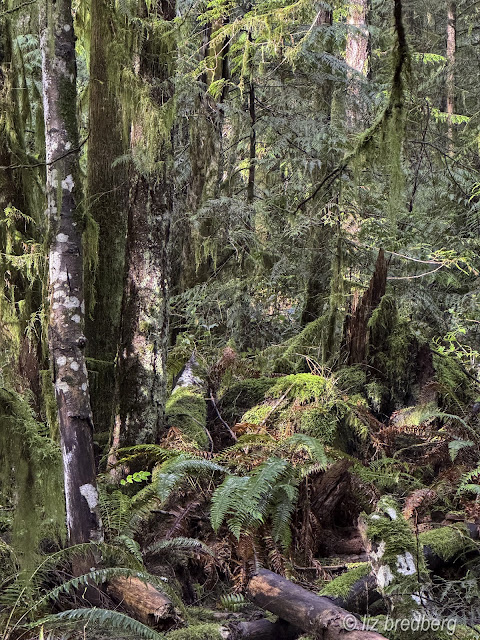16, 22 March
Spring is a bit later to arrive at the Hamilton Forest and Wetlands than it is down here in Parksville. I think it's a combination of slightly higher elevation and distance from the sea. Despite that, yes, spring is making its approach known.
The salmon berries are coming into bloom, one of the first harbingers in these parts.
They are a modest blossom, but the first vivid pink is a cheerful contrast to the limited spectrum of winter.
The light is changing as well, as the sun approaches its equinox elevation.
Mosses are showing new growth.
The frog chorus continues, with a variety of voices from different species. So far the bullfrogs aren't in evidence, unlamented.
The water level in the marsh is rising as the snow on the Beaufort Range melts.
Rain had threatened throughout the morning, but only a slight drizzle materialised.
22 March
An anniversary of sorts--moving into the third year of monitoring seasonal changes in the Forest and Wetlands. Even after this space of time, there are always new things to observe.
Another overcast morning, partly cloudy, a bit breezy, a bit chilly. There have been heavy rains the past days, and the path was quite boggy.
Mossy trunks and branches glowed in patches of sunlight.
The nurse stump continues to be challenged.
I followed the path a bit further, and as I'd anticipated, it leads to a swamp that is visible from the original loop trail. It was very wet after the recent rains, and I didn't pursue it further, but at that point the path itself looks to have been established some time ago. When the weather dries out, it will be interesting to see how it joins with the first trailhead.
There were a variety of knocking and pecking sounds in the Forest from what must have been a varied assortment of woodpeckers. One tree showed the work of sapsuckers.
Back on the main path to the Marsh, new growths of fungi and bryophytes are appearing. A western varnished conk emerges from a log,
and a stump hosts a variety of mosses and lichens, including a single shoot from a showy lipstick cladonia.
Approaching the Marsh, I was greeted by an exuberant chorus of frogs. frog chorus The mating season seems to be quite lively. Little clusters of spawn were abundant.
Rain was forecast for mid-day. Although the sky threatened,






















Comments
Post a Comment